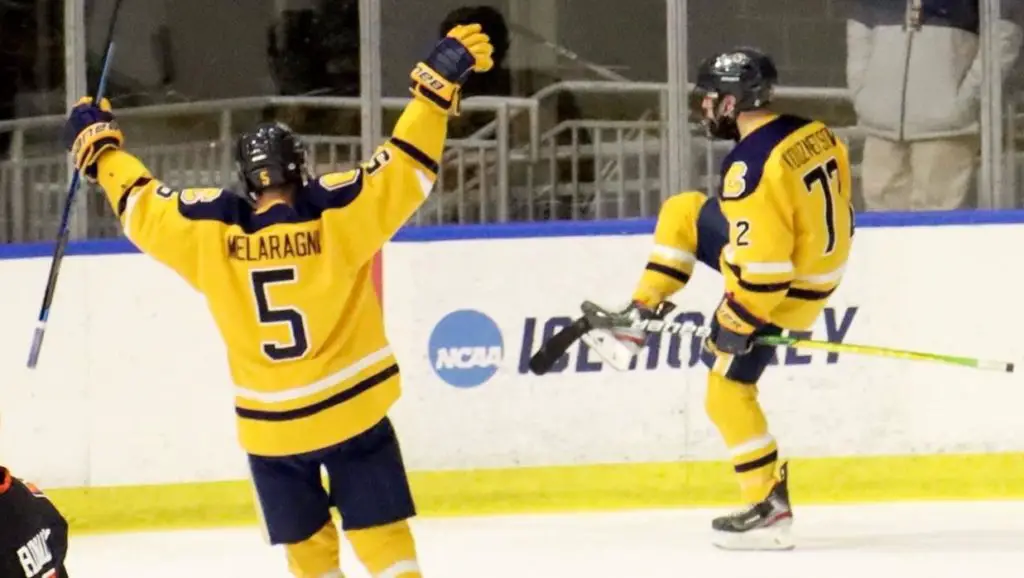
Quarterfinals week in Atlantic Hockey had all kinds of drama, starting with the unfortunate exit by Bentley from the postseason, due not because the program itself had any COVID issues, but because there was an uptick on campus, resulting in the suspension of school activities.
The Falcons were scheduled to play at American International in a quarterfinal series, but the cancellation moved the Yellow Jackets, the overall top seed in the AHA tournament, into the semifinals and the right to host the semis and finals on Friday and Saturday.
There was plenty of excitement in the three quarterfinal series that went ahead, with Army West Point, Canisius and Niagara advancing to Springfield over Sacred Heart, RIT and Robert Morris, respectively. For RMU, it’s the first time the Colonials have missed the semifinal round since 2014, a string of six straight interrupted by last season’s early and unexpected halt.
Over 260 minutes were played in three quarterfinal games on Saturday, highlighted by Army West Point’s series-clinching win over Sacred Heart. Colin Bilek scored his 18th goal of the season at 13:20 of the third overtime to put the Black Knights into the semifinals.
“Both teams battled hard,” said Army West Point coach Brian Riley.
“Games like that, it’s an emotional roller coaster, when the puck’s in your end especially. It can end so suddenly.”
The Black Knights extended their unbeaten streak to 13 games (12-0-1). That confidence, knowing how to win, helped on Saturday.
“Players were calm,” said Riley. “We’ve been a lot of close games (during the streak). Also, being up 1-0 (in the series), we were in a better spot (than Sacred Heart).
“We knew that we had a tomorrow.”
With the four semifinalists set, the matchups this Friday are:
Niagara vs. AIC
Canisius vs. Army West Point
Between the pipes
As the saying goes, goaltending wins championships, and there was plenty on display in the quarterfinal round. All three winners rode outstanding goaltending into the semifinals:
– Canisius swept RIT, 5-2 and 6-2 despite being outshot 68-47. Golden Griffins goaltender Jacob Barczewski stopped 64 of the 68 shots he faced.
– Niagara’s Chad Veltri made a whopping 125 saves in three games against Robert Morris, allowing only six goals.
– Trevin Kozlowski stopped 75 of 78 shots against Sacred Heart, including pitching a 4-0 shutout on Friday.
– An honorable mention goes to Sacred Heart’s Josh Benson who was outstanding on Saturday, making a school-record 68 saves in the triple overtime loss to Army West Point.
Four teams, one dream
To minimize travel, this season’s Atlantic Hockey schedule limited teams to a geographic pod (with the exception of Air Force, which played teams from both the East and West pods).
So it’s not until the semifinals that you see some crossover, with the top remaining East Pod team squaring off against the lower seeded West Pod team and visa versa.
This means all four teams will be facing an opponent they haven’t seen so far this season.
The coaches say it’s not that big of a deal.
“There’s a bit of a mystique,” said Niagara coach Jason Lammers. “It’s a building some of our kids haven’t seen before, a trip they haven’t made before. But I don’t think it will be much of an impact.”
“It’s not like we haven’t watched the western teams play all year,” said Riley. “You have an idea of tendencies. We’ll continue to focus on ourselves and what we have done and what we can do to be successful.”
“We won’t read too much into the east/west crossover,” said AIC coach Eric Lang. “Our staff covers every game of the weekend regardless of who we are playing. I don’t think we will see any surprises this time of year. You beat teams with your execution and getting the game scripted to how you want to play in order to have success.”
AIC faces a unique challenge, as the Yellow Jackets have been off since Jan. 30, a stretch that will reach 49 days before they take the ice on Friday against Niagara. AIC had its previous nine games canceled due to various COVID protocols.
“We had as good of a weekend as you could possibly have in terms of getting ready after not playing for six weeks,” said Lang. “We played two intersquad games with the exact game protocol, music, announcers, we even asked our coaches and players to wear their suits. We did our video and pre-scout exactly as we would on any game day. We wanted it to replicate exactly what we will be doing this week. We played two very intense games against ourselves and learned a lot from it.”
“(AIC’s layoff) is a factor,” said Lammers. “It’s a lot of time to sit, but they’ll be fresh. Being able to scrimmage helps.”
Canisius coach Trevor Large summed up the season and this particular situation in a word.
“It’s been weird,” he said. “But (the lack of crossover) doesn’t mean a lot. We know Army. While not seeing them is odd, we have video capabilities.
“I’ve coached with Brian Riley. I know how they want to play. They’re a really good team.”
For the four remaining schools, it’s going to come down to execution.
“We’re all the same,” said Large. “All four teams. We all have extreme confidence. We’ve all put wins together against quality opponents. It’s going to be ultra competitive.”
Managing the impossible
At this time last season, the college hockey world was coming to grips with the sudden halt of games and sudden ends to college careers.
This time (knocks wood), there will be champions crowned and closure found, at least for most teams.
“My heart goes out to Holy Cross and Bentley,” said Atlantic Hockey commissioner Bob DeGregorio. “It’s hard to put into words what this season has been like.”
From the start, nothing has gone according to plan, with adjustments being made on an almost daily basis.
“We started with a 34 game schedule,” said DeGregorio. “Going in, how can we make the best schedule possible? How can we make everybody safe and still play games? We got input from athletic directors and coaches. We brought in LIU (Long Island University) to balance the numbers. Air Force had a tough assignment.”
But operating in a pandemic meant constant adjustments, backed by the fear that the league might not make it to the finish line.
“We got shut down in October,” said DeGregorio. “There were concerns that there seemed to be some spiking (of cases). There was talk then of pumping the brakes and waiting (to start the season) until January. But I was concerned, the experts were saying, that January and February could be worse. I just felt like if we stopped, we’d never start back up.”
At the end of the regular season, Atlantic Hockey teams had played anywhere from 13-21 games.
“Everybody worked hard,” said DeGregorio. “Players, coaches, trainers, athletic directors. We tried to make sure we covered all of the bases.
“Make adjustments. Control travel. Control exposure.”
“It’s been a tough season, but in some ways our most rewarding season,” said Riley.” I’m thankful to people behind the scenes, trainers, health officials, all the way up to our Superintendent. I wouldn’t want to play for anyone else in a pandemic.”
In closing
This is my final column for the season. It’s my 22nd year at USCHO, my 15th covering Atlantic Hockey. I’m grateful to all the coaches, players and sports information directors who made time for me this season and every season.
I’m also thankful for Matt Mackinder, my editor, for being kind to my mistakes.
My co-columnist, Dan Rubin, kept things fresh and picked up the load for many weeks when my family and I were hit with health problems. I couldn’t have asked for more. It’s been a great partnership that I hope lasts for a long time to come.
And lastly, thanks to my family for continuing to support my passions. It’s been a rough year for us, and I know that’s been the case for many, many families. But we’re still standing.
It’s getting better. I truly believe that. Stay safe. Take care of each other. Enjoy the hockey that’s yet to come.


